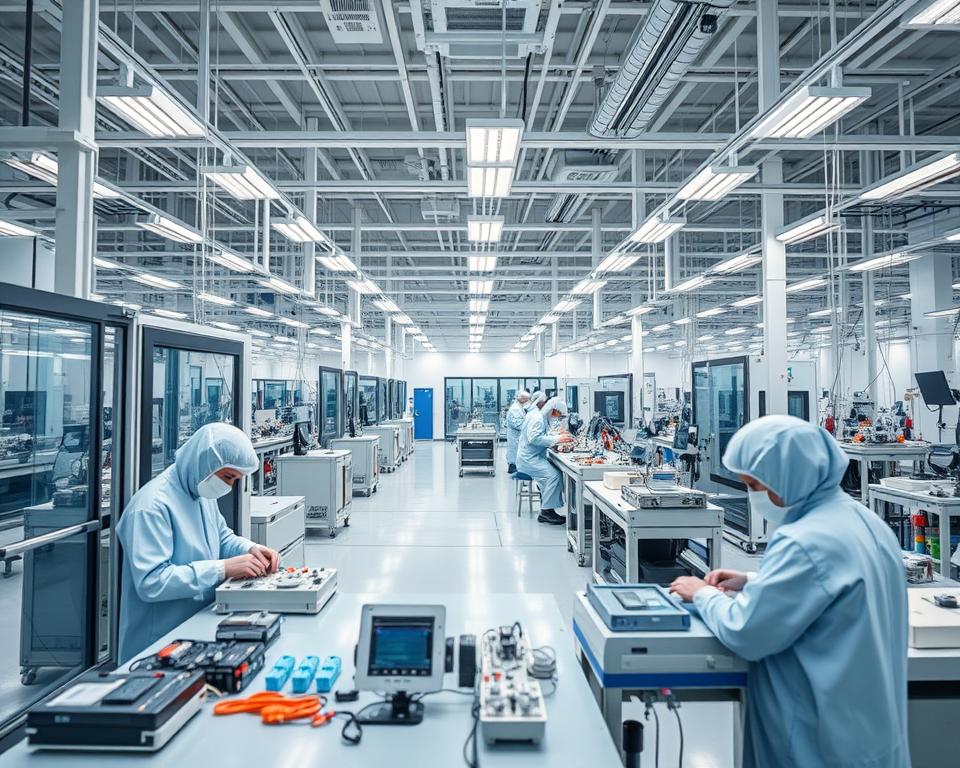Expert Contract Manufacturing for MedTech by AMT.
For about 85% of medical device startups, finding a trustworthy manufacturing partner is vital. This heavily influences on-time market entry.
Based in Singapore, AMT Pte Ltd is an expert in contract manufacturing. Backed by years of contract manufacturing of medical devices by AMT experience, AMT supplies complete medical device manufacturing services. AMT manages everything—from materials sourcing and rapid prototyping to precision assembly and market launch.
With ISO 9001 and ISO 13485 certifications, AMT ensures regulatory compliance for exports to the U.S. and EU. Compliance focus reduces OEM risk and helps accelerate regulatory filings.
AMT is essential for medical device OEMs, startups, and product teams. By partnering with AMT, teams streamline production, reduce cost, and speed launch. Companies can scale capacity with AMT while maintaining design control and secure IP protection.
Summary Points
- AMT integrates OEM expertise with complete production services.
- Strong regulatory certifications: ISO 9001, ISO 13485, and alignment with 21 CFR Part 820.
- Services cover procurement, prototyping, assembly, and final release for global markets.
- Outsourcing to AMT cuts capital expenditure and compresses development timelines.
- Ideal for OEMs, startups, and product teams seeking a reliable Singapore partner.

Medical Device Market Outlook and Growing Need for Contract Manufacturing
Worldwide demand for medtech is rising rapidly. Experts believe the market will be worth more than $595 billion by 2024 and might even reach $625 billion by 2027, expanding at ~6% annually through 2030.
This growth drives a strong need for agile production, broader portfolios, and reliable quality from partners who provide top-notch medical device manufacturing services.
Advances in cardiac, bone, neuro, urinary, and diabetes technologies are causing a surge in new products. Because these categories require precision parts, electronics, and sterilizable items, many device makers are outsourcing.
They do this to leverage specific tooling, automated processes, and inspection systems without large capital outlay.
By outsourcing, companies can get their products out faster. With facilities, cleanrooms, and expertise, contract manufacturers compress design-to-launch timelines. Partnerships are vital for remote-control and connected health devices to scale effectively.
Singapore is a leading hub for medtech supply and logistics. It has talented engineers, follows global rules closely, and is near many Asian markets. Hence Singapore is ideal for medical device contract manufacturing by firms like AMT for both small and large orders.
As makers of medical devices focus more on their core competencies, they look for the best contract manufacturing partners to lower risks and speed up product launches. Singapore partnerships combine domain expertise, robust supply chains, and deep manufacturing to deliver complex products worldwide.
Why OEMs Choose Medical Device Contract Manufacturing
As production scales, OEMs team with specialists to focus on design, regulatory plans, and commercialization, while experts run manufacturing—an effective approach under stringent quality.
Focus on Core Competencies: R&D, Marketing, Regulatory
When OEMs let engineers focus on R&D and regulatory planning, outcomes improve. By outsourcing production, they can reallocate effort to testing, labeling strategy, and market outreach. With AMT, design changes stay traceable and audit-ready.
CapEx Avoidance with Scalable Production
Smaller companies struggle with high equipment and cleanroom costs; teaming with AMT for custom medical device manufacturing avoids these big expenses. Ready infrastructure allows rapid prototyping or scale-up without major equipment buys.
Faster Time-to-Market via Rapid Prototyping
Speed is crucial in telehealth and wearables. AMT’s contract manufacturing accelerates prototyping, testing, and transfer to production, resulting in shorter development and quicker approvals.
| OEM Need | What AMT Provides | Benefit to OEM |
|---|---|---|
| Regulatory documentation | ISO-aligned QMS with validation support | Cleaner audits and faster approvals |
| Prototyping & iteration | Rapid tooling, electronics integration, small batches | Faster design cycles and reduced time-to-market |
| Scale-up to production | Automation with validated processes | Predictable lead times, lower unit cost |
| Cost control | Lean methods with supply-chain control | Lower CapEx, improved margins |
| Specialized builds | Custom manufacturing for disposable and electronic devices | Multidisciplinary expertise without headcount |
Partnering with AMT transforms development via expertise, equipment, and quality systems, enabling faster patient access—smart for growth-focused companies.
AMT and contract manufacturing of medical devices
From prototype to production, AMT provides single-point accountability, simplifying procurement, build, and shipment of complex devices.
Full assembly, tailored production, rapid prototyping, commercialization plans, and scalable ramp-ups are traceable end-to-end to cut risk and speed updates.
End-to-end service model & full assembly contracts
AMT engineers co-develop DFM with OEM teams to cut rework, shorten builds, and improve output while handling sourcing, QC, and assembly.
ISO 9001/13485 & 21 CFR 820 Compliance
ISO 9001/13485 with 21 CFR Part 820 processes ensure audit-ready, globally compliant devices.
Cleanroom capabilities, tooling and automation at AMT facilities
AMT plants feature cleanrooms, advanced tooling, and automation for scale; automation reduces errors and supports detailed part tracking to meet sterilization and cleanliness requirements.
Manufacturing Core: Molding, PCBA, Precision Assembly
Advanced methods allow AMT to serve low/high volumes consistently for hospital, clinic, and home-care needs.
Injection molding produces strong, sterilizable parts ideal for medical use—housings, brackets, adapters—reducing cost while meeting strict cleanliness standards.
PCBA underpins medical electronics—AMT makes monitors, wearables, telehealth modules with controlled soldering and traceability.
Precision assembly brings together mechanical parts and electronics into dependable products; expert technicians and strict inspections deliver high quality using approved materials and components.
Supply chain management reduces risk and tracks every part—lot tracking and supplier checks ensure standards are met, enabling reliable, compliant devices.
Quality Systems, Compliance & Risk Management
AMT’s quality aligns to ISO 9001/13485 and 21 CFR 820, using gated checks across design/production/release to cut risk and build confidence.
QMS aligned with FDA & ISO
Procedures, WI, training, audits, supplier oversight, and management reviews maintain compliance and reduce errors, aiding global submissions.
Design transfer, verification, validation and documentation practices
Seamless design transfer with V&V confirms performance; documentation and DHFs streamline submissions and sustain lifecycle.
Mitigating Supply Risk with Traceability
Teams select suppliers carefully and maintain AVL lists; serial/lot tracking prevents issues and protects product integrity even during critical component sourcing.
An experienced CM such as AMT ensures quality, compliance, and risk control end-to-end.
Proof Points: AMT Case Studies and Successes
AMT is known for tackling demanding projects in respiratory therapy and telehealth; case studies show how partnering with AMT accelerates development, ensures quality, and meets regulations in Singapore and abroad.
Telehealth ventilator project and remote-control innovations
AMT, as Tier-2, enabled a telehealth ventilator with manual/remote control, reducing PPE use and enabling centralized monitoring—evidence of connected-care capability.
Respiratory Therapy: Assisted Cough Examples
AMT built systems for high-frequency chest vibrations, lung expansion, and cough assistance, maintaining airway patency with Positive Airway Pressure during breaks and using clean air-path control—requiring exact PCBA, precise molded fluid paths, and clean packaging—proving leadership in respiratory devices.
Single-use surgical components such as TURP electrodes
AMT produces single-use TURP electrodes in stainless steel or tungsten, delivered sterile—demanding material control, traceability, and sterile packaging—highlighting proficiency in disposable surgical manufacturing.
Cross-project learning helps move faster new products; insights from ventilators and respiratory builds aid wearable insulin pumps and surgical tools—making AMT a smart partner for scaling capabilities and speeding market entry.
Cost, Timeline & Commercial Benefits with AMT
Partnering with AMT avoids cleanroom/equipment CapEx, freeing budget for design and launch.
AMT saves on components via purchasing power; skilled sourcing obtains quality parts at better prices, helping competitive retail and clinical pricing.
Quick prototyping and automated processes accelerate development—moving swiftly from prototype to full production and helping meet clinical and regulatory deadlines sooner.
Timing is key for products like wearable insulin pumps; AMT’s in-house testing and supply chains have accelerated such programs.
Scaling from pilots to volume stays compliant and consistent, enabling multi-market entry.
Outsourcing lets internal teams focus on sales and support while AMT handles production and regulation, aiding faster market entry.
With AMT, costs drop, timelines compress, and scale grows—accelerating revenue and enabling expansion.
Technical Collaboration: Engineering, Prototyping & DFM
Technical collaboration starts with clear goals and early alignment; AMT engineers join OEM teams to shape build, choose materials, and propose assembly methods—reducing design risk and accelerating development while strengthening partnership.
Upfront Co-Engineering
Experience-informed reviews catch risks early and suggest cost-saving refinements—a major edge for custom devices.
Rapid Prototyping & Iteration
Fast prototypes→tests→iterations shorten the path to final design and reduce late changes.
Design for Manufacturability
Part consolidation and assembly simplification improve yield, reduce cost, and smooth scale-up.
| Collaboration Stage | AMT Role | Expected Benefit |
|---|---|---|
| Concept/Early Design | Architecture review, material selection, risk assessment | Lower risk with a clearer roadmap |
| Prototype | 3D prints, functional prototypes, PCBA prototypes | Faster validation and regulatory data for submissions |
| Iterative testing | Performance testing, user trials, design tweaks | Higher reliability, fewer late changes |
| DFM implementation | Consolidation, tooling advice, simpler assembly | Lower cost per unit and higher production yield |
| Ramp-up | Pilot runs, process validation, supplier integration | Smoother transfer to volume production under a contract manufacturing partnership with AMT |
When seeking custom medical device manufacturing, clients benefit from problem-solving engineers; emphasis on prototypes, testing, and DFM boosts readiness and strengthens confidence in a long-term AMT partnership.
How to Choose a Contract Manufacturer in Singapore
Your CM choice drives quality, compliance, and speed; Singapore’s logistics, talent, and compliance are strong—compare candidates to protect value.
Certifications & Track Record
Verify ISO 13485/9001 and 21 CFR 820; assess QMS docs (CAPA, DHR); seek evidence in respiratory, telehealth, and disposables.
Facility capabilities and logistics
Examine cleanrooms, tooling, injection molding, PCBA, and automation; visit sites to confirm space and environmental monitoring; Singapore’s location enables fast ASEAN and global shipping—ideal for global launches.
IP Protection, Communication, Partnership
Ensure secure project management and design handling; protect IP with controlled access and qualified suppliers; evaluate engineering support and supply continuity; confirm ability to scale across target markets.
| Area | What to check | Why it matters |
|---|---|---|
| Regulatory Compliance | ISO 13485, ISO 9001, 21 CFR Part 820, FDA-aligned QMS | Ensures market entry readiness and lowers regulatory risk |
| Technical | Cleanrooms, molding, PCBA, automation, tooling | Supports reproducible quality and scalable manufacturing |
| Domain Experience | Relevant case studies in key domains | Shortens onboarding and improves first-run yields |
| Logistics/Location | Proximity to ports, ASEAN channels, lead times | Reduces transit delays and inventory costs |
| Commercial & Legal | NDA terms, IP controls, contract flexibility, pricing models | Protects assets and allows scalable agreements |
| Communication & Culture | Tools, reporting, audits | Improves transparency and long-term collaboration |
Ask for customer feedback and conduct site visits to validate claims; pilot a small batch to assess process and supply fit—proper diligence builds confidence in a long-term partnership with AMT or another top medical device firm.
Future trends affecting medical device contract manufacturing
Personalization and digital acceleration drive the future; flexible tooling, data systems, and skilled people will be essential.
Additive manufacturing enables patient-specific, small-batch runs for quicker, less wasteful care.
Automation and analytics detect issues early to support release; AMT leverages smart tech to sustain standards.
Precision-heavy cardiac/orthopedic devices will push providers to expand capabilities.
Secure software and robust electronics in telehealth underscore collaboration needs with CMs.
Blending human expertise with automation will differentiate leaders who choose the right programs.
The Bottom Line
Contract manufacturing of medical devices by AMT is a savvy choice for OEMs focused on research and market expansion; AMT’s ISO 9001/13485 and 21 CFR Part 820 systems, plus cleanrooms and injection molding, accelerate market entry while meeting strict compliance.
Telehealth ventilators and TURP electrodes showcase AMT’s breadth and quality, reinforcing outsourcing as a strong path to regional growth.
With upfront collaboration, rapid prototyping, and efficient sourcing, amt – contract manufacturing of medical devices can boost capacity and regulatory readiness while saving time and cost.
